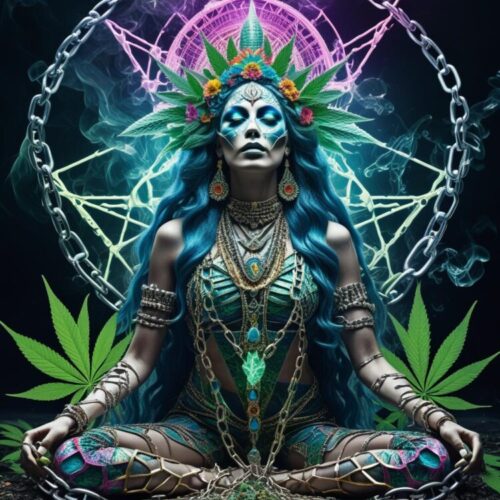“We all know people who smoke or ingest a lot of cannabis. But does that mean they are all addicts? And even if they fit into the criteria of addiction, is cannabis the primary issue?”
We all know the stereotype.
The lazy stoner who can’t stop smoking weed and plays Mario Kart all day is a common one. We all have known someone like this. But what about all the high performers who are cannabis enthusiasts? How can we reconcile these two opposing truths?
Clearly, the story of cannabis addiction is not so simple.
One of the most common critiques of cannabis use is that it has high addictive potential. Worse yet, the anti-cannabis crowd falsely claims it is a gateway drug. One that will lead you to become addicted to other drugs.
But how true is this? Is this true for everyone? Does lighting up a joint guarantee that you will become severely addicted to cannabis? Or end up in a heroin treatment center? (Spoiler alert: The answer is no!)
In Holistic TherapeutiX’s latest blog piece, we’ll be discussing some myths around cannabis addiction. We’ll also discuss specific contexts in which cannabis can actually help us quit addictions to other drugs or vices (think gambling, porn, shopping ect.)
The story of cannabis addiction has been misrepresented for decades now. It’s time we shed some light on just how “addictive” cannabis is.
What do you mean cannabis isn’t addictive? I know people who use it every day!

“Would we call these people addicts? Or are they self-treating a serious condition with an effective medicine?”
Let’s begin by discussing some of the nuances of cannabis addiction.
We all know people who smoke or ingest a lot of cannabis. But does that mean they are all addicts? And even if they fit into the criteria of addiction, is cannabis the primary issue?
Just because someone uses a high amount of cannabis does not necessarily mean they are an “addict”. The definition of an addict is also very specific. Labeling someone as such should be reserved for mental health professionals.
Many people use cannabis for chronic pain daily. A study funded by the National Institute of Drug Abuse (NIDA) in 2023 found that “more than half” of these daily users “reported that use of cannabis led them to decrease use of prescription opioid, prescription non-opioid, and over-the-counter pain medications.”
Would we call these people addicts?
Or are they self-treating a serious condition with an effective medicine?
And what about the fact that cannabis is so effective for their pain, they are decreasing their use of dangerous prescription drugs? Prescription drugs with frightening addiction potential and serious effects on health.
As I hope is becoming clear, labeling someone a cannabis addict based purely on the fact that they use high amounts of cannabis would not be fair. We will touch on this more in the next section, but the study funded by the NIDA is also evidence that cannabis can help us quit or reduce the use of other drugs that have a higher risk profile than cannabis.
Many cancer patients use cannabis to deal with the symptoms of chemotherapy, and to stimulate appetite. Clearly, these people are not “addicts” overindulging in a vice. The list could go on and on. But I think it’s clear there are several reasons someone may use cannabis every day, and not be an “addict”.
What about the people we know who maybe are “addicts”? They seem to use every day, even though they don’t have any serious illnesses, chronic pain, or epilepsy issues. Maybe they show up to most of the social events we attend “high”. Maybe they use cannabis for things we deem not necessary such as exercising, focus, or sleep.
Are these behaviors solely due to cannabis’s addictive nature? It would be easy to assume the answer is yes. But the truth for most “addicts” is far more complicated, and a bit tragic.
The Basis of Addiction

“It doesn’t matter if it’s alcohol, heroin, gambling, exercise, workaholism, or cannabis. The compulsion to engage in a behavior despite negative consequences, and the inability to stop comes down to the fact that people are attempting to cope with some kind of pain or trauma. The compulsion only grows stronger if they don’t have strong social ties.”
The basis of most addictions, no matter the drug or vice, is:
- emotional pain and/ or unresolved trauma.
- combined with our brains need to bond with other humans.
It doesn’t matter if it’s alcohol, heroin, gambling, exercise, workaholism, or cannabis. The compulsion to engage in a behavior despite negative consequences, and the inability to stop comes down to the fact that people are attempting to cope with some kind of pain or trauma. The compulsion only grows stronger if they don’t have strong social ties.
Our brains are hardwired towards bonding with other humans. Bonding with other humans is one of the most effective central nervous system regulators we have. Our brains know this. It pushes and drive us towards healthy social connection. Healthy social connection stimulates the pleasure center of our brains, which results in peace, contentment, and down-regulation. For people dealing with raw emotional pain or unresolved trauma, this drive to bond is far greater than normal.
When these people do not have effective emotional support available to them (such as strong community, a strong social circle, or a good therapist), this drive to bond in order to down-regulate remains.
So where does this drive go? Without strong social ties to latch onto, our brains begin seeking other ways to down-regulate.
Our brains are extremely focused on our survival, and when raw emotional pain or trauma is dysregulating us, our brains push us to seek activities or substances that will regulate us and calm us.
Our brain will also remember what works and what doesn’t. When something “works”, our brains feels as if we bonded with the behavior or substance. In some sense, we did.
This is a classic example of how a maladaptive coping mechanism forms.
Everyone who has gone through alcohol addiction can remember a time or two when they were feeling overwhelmed or flustered. They had a few beers and all of a sudden felt better. The alcohol brought them a feeling of peace and content. They “bonded” with the alcohol.
Our brains remember this and begin releasing dopamine when we drink beer (or even just by seeing cues that alcohol is coming) in order to motivate us to continue pursuing that behavior. What’s worse is the longer we engage in this behavior, the stronger our brain latches onto this effective down-regulator.
This “bonding” and resulting down-regulation, is the basis of addiction.
As long as the pain or trauma remains unprocessed, and as long these people are not able to begin bonding with other humans, they will continue to be “addicted” and seek other ways to regulate.
This is why addiction replacement is so common. Quitting alcohol can be easier in some sense if we replace alcohol with another compulsive behavior which brings us pleasure. But we are just dealing with the symptoms when we do this, not the cause.
The cause is the unprocessed pain or trauma. It’s not the substance or behaviors fault. This is why mentally healthy people are able to drink in moderation.
When we take into account the basis of addiction, we can see why cannabis itself is not “addictive”. Cannabis is an excellent down-regulator and does stimulate the pleasure center of the brain.
But when people become “addicted” to cannabis, it is not because cannabis is inherently addictive. These people are dealing with severe emotional pain, and are not bonding with other humans. Their brains are determined to keep them alive and push them to continue using cannabis in order to cope with or soothe emotional pain.
This also explains why mentally healthy people are able to use cannabis in moderation, and without the compulsion to continue using.
Due to the way our brains seek down-regulation when social support is not available, if these people were not addicted to cannabis, they would likely be addicted to something else.
The way to break the cycle of addiction, whether to one behavior or several, is to process and come to terms with the emotional pain or trauma an “addict” is dealing with. It is also vital to seek and find strong social support.
In the next section, we’ll discuss how cannabis used in ceremonial settings is actually an excellent method for deep emotional processing and healing.
How Cannabis Can Help You Quit Other Addictions
Now that we have covered the basis of addiction, we can discuss how psychedelic cannabis can actually help us quit addiction, not cause it.
Cannabis isn’t the only psychedelic with the ability to help us quit addictions.
(If you are curious about the difference between psychedelic cannabis and recreational cannabis, read one of our recent blog pieces here.)
Both LSD and psilocybin mushrooms have shown incredible promise in helping people quit alcohol addiction. Ibogaine continues to shock researchers with its ability to help people quit heroin, a notoriously addictive substance.
The reason for this is because psychedelic experiences, especially in proper set and settings, can bring about profound emotional healing by inducing an incredibly high level of self-awareness, introspection, and neuroplasticity.
Let’s continue with the example of someone who finds themselves compulsively using alcohol to cope with emotional pain or trauma.
Self-Awareness and Introspection

“With proper set and setting, and a feeling of calm and safety, this drinker can finally analyze and become self-aware of their behavior patterns, and their unhealthy relationship with alcohol. They may notice alcohol is their go-to down-regulator when they are feeling pain or when an unresolved trauma gets triggered.”
One of the reasons alcohol is so hard to quit is because of its detrimental effects on executive function and general cognition. This study in particular found that “habitual drinkers experience a reduction in their capacity to process new information, gain new skills, and formulate plans.”
One area of executive functioning that is also affected is the ability to engage in self-awareness. According to Bonfire Behavioral Health, “when somebody is suffering from an addiction, they experience dysfunction within the part of their brain that controls their self-awareness. As a result, drug and alcohol addictions can reduce self-awareness of the abuse.”
Essentially, chronic use of alcohol inhibits our brains ability to engage in self-reflection and introspection. Unfortunately, these two abilities are key in helping us quit addictions.
With impaired self-awareness and introspection, habitual drinkers may be underestimating the severity of the issue, and the impact it is having on their life and well-being. It is even possible they are not aware that they are using alcohol to cope, or that when they become emotionally unsettled, their brains first instinct is to “crack a cold one”.
A psychedelic cannabis journey (such as the ones we offer at Holistic TherapeutiX) can prompt an altered state of consciousness that allows us to engage in deep introspection. For a habitual drinker, this may be the first opportunity to do so in a long time.
With proper set and setting, and a feeling of calm and safety, this drinker can finally analyze and become self-aware of their behavior patterns, and their unhealthy relationship with alcohol. They may notice alcohol is their go-to down-regulator when they are feeling pain or when an unresolved trauma gets triggered.
They might also notice that they are drinking more than ever before and reflect on how it is affecting their cognition and their personal life. With this ability to take a macro view of their life and behavior, and taking note of all the issues, they can begin the journey of quitting their addiction.
They may also finally realize the crux of their drinking habits. It could be they started drinking a lot more after they lost their job, or after a recent breakup. This would be an example of raw emotional pain that has not been healthily processed.
The crux could be something from a long time ago as well however, in the form of an unresolved trauma.
According to a study from Trauma-Informed Care in Behavioral Health Services, “some trauma survivors have difficulty regulating emotions such as anger, anxiety, sadness, and shame – this is more so when the trauma occurred at a young age.”
What this means is that trauma survivors suffer from more general dysregulation and find it much harder to reach regulation after becoming unsettled or flustered. This makes trauma survivors much more prone to addictions of all kinds.
Another study in 2014 found that “childhood trauma was significantly more prevalent and more severe in alcohol dependent subjects”.
With the container of a psychedelic cannabis journey, these people finally have an opportunity to become aware of how unresolved trauma is affecting their relationship to alcohol. This journey would also be an excellent place to begin the healing of this trauma.
Once the healing of these trauma begins, these people will find themselves more naturally regulated. They will also find it much easier to return to regulation after becoming dysregulated.
By experiencing more general regulation, their compulsion and craving to consume alcohol will also decrease substantially. The key to recovery is the healing of the trauma or pain that dysregulates us in the first place. By doing so, we can also avoid the trap of addiction replacement.
Let’s now briefly discuss how psychedelic cannabis can induce neuroplasticity, and how neuroplasticity can help us heal from trauma far quicker than normal.
Psychedelic Cannabis and Neuroplasticity
One of the most powerful effects of psychedelic cannabis is its ability to induce neuroplasticity in our brains. Neuroplasticity is a general term that refers to a state of our brain where our brains can more easily adapt, strengthen, and form neural connections and networks in response to external stimuli.
Our brains are quite plastic during childhood but become much more rigid in adulthood. This is why children are more efficient learners than adults.
During a psychedelic journey, we can re-open this child like neuroplasticity and make changes to our brains that would be much more difficult in a sober state.
In relation to trauma healing, neuroplasticity allows us to rewire and change parts of our brain that were affected when the trauma originally happened.
This may involve the:
- Amygdala
- Hippocampus
- Pre-Frontal Cortex
- Reptilian brain
- Central nervous system.
Trauma has many effects on these parts of the brain. But in general, trauma teaches our brain to remain in a hypervigilant state. This maladaptive coping mechanism results in becoming triggered by normally mundane things in our environment. A person’s brain who suffered severe trauma will respond to almost everything as if it is a threat, and their “fight-or-flight” response becomes activated far too frequently.
This results in a difficulty to control our emotions and makes it much more difficult to down-regulate. If we are also not bonding with other humans, it becomes almost easy to become addicted to alcohol or other substances.
In the safety of a psychedelic journey, we can revisit the original trauma in a safe way. A way that is not overwhelming or re-traumatizing. We can begin the work of rewiring the parts of our brain that are overreactive and hypervigilant.
It should be noted that the process of trauma recovery is a more complicated and lengthy than we can cover here. But in simple terms, we can integrate and re-process the traumatic memory in a psychedelic journey. By doing so, the parts of our brain that are hypervigilant will start to relax.
We are now more able to move through the world with more regulation, and more agency to down-regulate when we do inevitably become triggered by the stressors of life.
By healing the crux of the dysregulation at its source, and by providing us more accessible peace and calm, we can finally break the cycle of addiction.
Is Cannabis Addictive? Or Can it Free us from Addictions?
As we have covered in extensive detail, the story of cannabis addiction (and addiction itself) is complicated.
There are many people who use cannabis every day, for a number of reasons. It may be for chronic pain, epilepsy, or chemotherapy. It may also be for focus, or to help people sleep. It may be that people think they are using it recreationally but are actually using it to self-soothe.
Whatever the reason, this does not inherently mean they are addicts. It also does not mean cannabis is inherently addictive. People can and do become addicted to several behaviors.
We also covered that the basis of addiction is unresolved pain or trauma, along with our brains need to bond with other humans. This need to bond is greater in people without strong social support.
The majority of people who do fit the medical criteria for an “addict” are in pain, and do not have the emotional or social support they need to deal with this pain. Because our brains love us and are focused on our survival, it pushes us to seek other ways to cope with this pain.
By inducing deep self-awareness, and enhanced neuroplasticity, psychedelic cannabis can actually help us quit addictions of all varieties. Through a psychedelic cannabis journey, it can help us become aware of the severity of the issue and help us heal from the raw emotional pain or unresolved trauma that is driving us to seek down-regulators in the first place.
The story of cannabis addiction is quite nuanced, but we believe the psychedelic cannabis services we offer at Holistic TherapeutiX may be the first step in healing the source of addiction.

